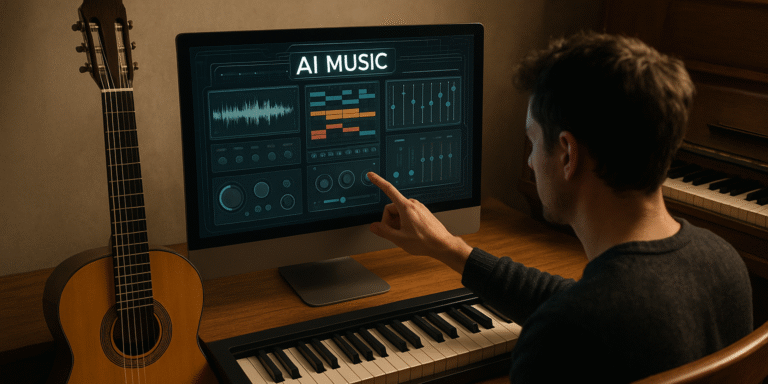Artificial Intelligence (AI) has made significant strides in various industries, but its impact on music is one of the most discussed topics in 2024. From AI-generated songs to algorithmic composition, music professionals are grappling with whether this technological shift will elevate creativity or erode the authenticity of the music industry.
Introduction to AI in Music
AI is revolutionizing the music industry in ways previously unimaginable. With AI tools now capable of generating melodies, lyrics, and entire compositions, musicians are facing a dilemma: will this technology enhance the creative process or diminish the artistry at the heart of music? AI-driven software such as OpenAI’s Jukedeck and IBM’s Watson has shown that machines can analyze and replicate musical patterns, allowing artists to generate music at the click of a button.
This trend is already empowering emerging musicians by enabling them to produce high-quality music without expensive equipment or studio time. AI can also assist with tasks such as mixing, mastering, and structuring songs, freeing up time for creative exploration. While many view AI as a positive force in music, others are concerned about its potential to alter the core of what makes music special—its emotional depth and human touch.
AI as a Creative Tool
For many musicians, AI has become an indispensable creative tool. It offers a new way to experiment with sounds, push genre boundaries, and quickly generate new ideas. Electronic musicians and composers, in particular, are excited about the possibilities AI provides in creating innovative and complex sounds that might have taken years to discover using traditional methods.
AI also democratizes music production. Independent artists who lack access to expensive studio equipment can now produce professional-sounding tracks using AI-powered tools. This shift could level the playing field, allowing more people to enter the music industry without the traditional barriers to entry. By automating repetitive tasks like mixing and mastering, AI also enables musicians to focus on the more creative aspects of their work.
The Risk of Homogenization
Despite its potential benefits, AI in music has its critics. One major concern is that over-reliance on AI could lead to the homogenization of music. AI algorithms are trained on existing data, meaning they often mimic popular trends and styles. As a result, some worry that this could lead to formulaic music, where songs sound overly similar and lack originality.
Music is often driven by personal experiences and emotions, and critics argue that AI-generated songs may lack the depth and authenticity that human musicians bring to their work. While AI may be able to generate melodies that are technically impressive, they may not resonate emotionally with listeners in the same way that a song crafted by a human artist can.
Furthermore, there are concerns about job displacement within the music industry. As AI tools become more advanced, there is a fear that musicians, producers, and songwriters could find themselves replaced by machines. With AI able to compose entire tracks and even replicate the style of well-known artists, some believe that AI could render traditional music-making roles obsolete.
Musicians’ Views
The response from musicians regarding AI has been divided. Supporters of AI argue that the technology can help push creative boundaries, allowing musicians to experiment with new sounds and techniques that might have been out of reach before. By removing technical barriers, AI also provides more opportunities for musicians to innovate.
However, many musicians fear that AI could undermine their livelihoods. As the technology becomes more advanced, there is a concern that AI-generated music could take over commercial music production, leaving human musicians with fewer opportunities. Some artists argue that AI’s inability to capture the nuances of human emotion means it will always fall short of the artistry that defines music.
Others, however, see AI as a tool for collaboration, rather than a replacement. These musicians believe that, while AI can generate ideas and help with technical aspects, it still requires a human touch to truly create something special. For them, AI is not a threat, but an opportunity to enhance their creative process.
Conclusion: The Balance Between Technology and Creativity
As AI continues to evolve, the music industry will need to find a way to balance technological innovation with the emotional and personal elements that make music so powerful. AI offers incredible potential for creativity and productivity, but it should never replace the human aspect of music-making.
The future of music will likely involve a combination of human creativity and AI technology, where both work in harmony to produce innovative, emotionally resonant music. By embracing AI as a tool for creativity while preserving the authenticity of human expression, the music industry can evolve without losing the very essence of what makes music an art form.


